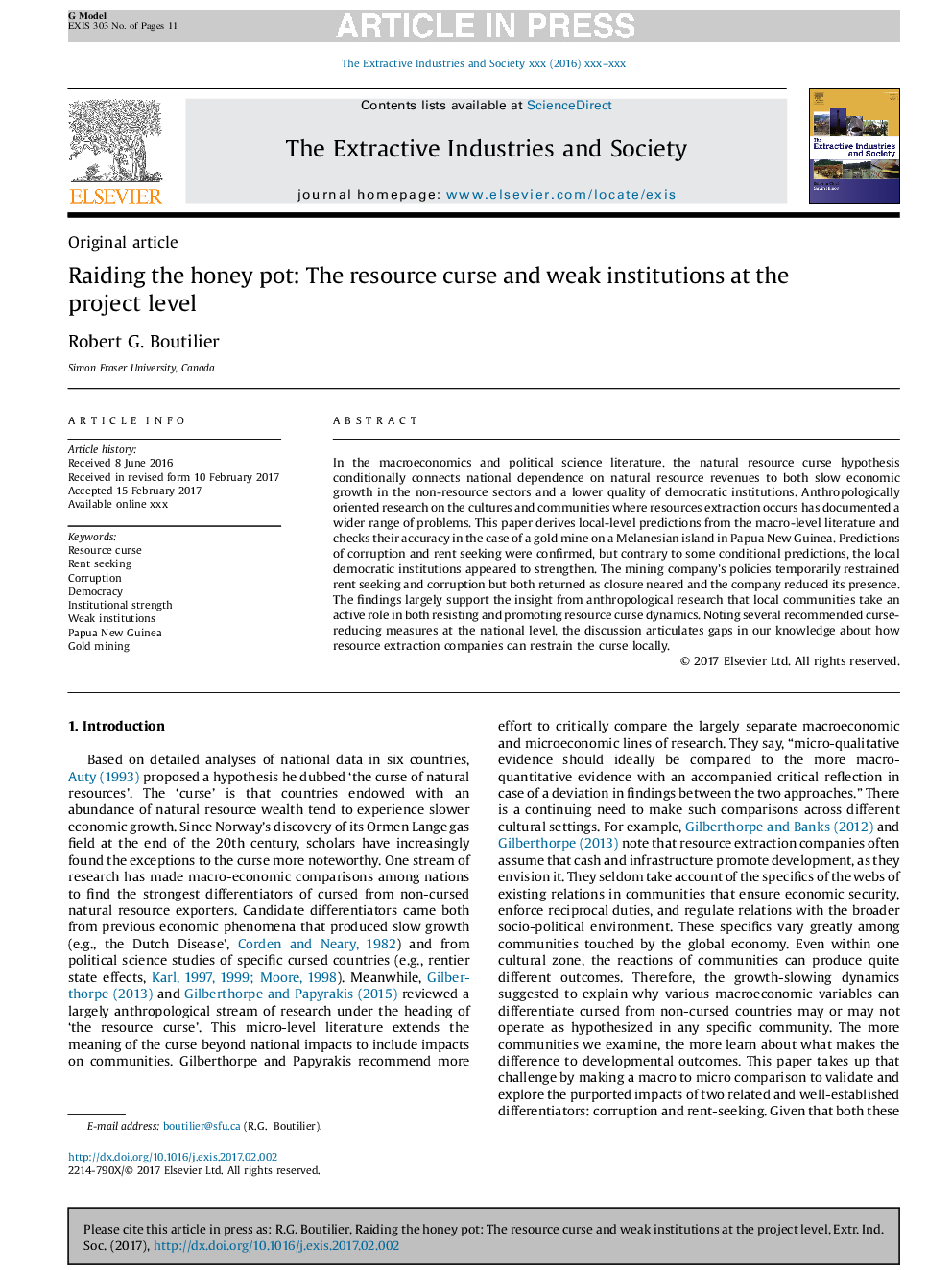| کد مقاله | کد نشریه | سال انتشار | مقاله انگلیسی | نسخه تمام متن |
|---|---|---|---|---|
| 5114398 | 1484420 | 2017 | 11 صفحه PDF | دانلود رایگان |
عنوان انگلیسی مقاله ISI
Raiding the honey pot: The resource curse and weak institutions at the project level
ترجمه فارسی عنوان
رد کردن گلدان عسل: نفرین منابع و موسسات ضعیف در سطح پروژه
دانلود مقاله + سفارش ترجمه
دانلود مقاله ISI انگلیسی
رایگان برای ایرانیان
کلمات کلیدی
نفرین منابع، اجاره یابی، فساد، دموکراسی، قدرت نهادی، نهادهای ضعیف، پاپوآ گینه نو، استخراج طلا،
ترجمه چکیده
در ادبیات اقتصاد کلان و علوم سیاسی، فرضیه لعن منابع طبیعی به طور مشروط وابستگی ملی به درآمدهای منابع طبیعی را به هر دو رشد اقتصادی در بخش غیر منابع و کم کیفیت نهادهای دموکراتیک متصل می کند. تحقیقات انسان شناختی گرا در مورد فرهنگ ها و جوامع که در آن استخراج منابع رخ می دهد، طیف وسیعی از مشکلات را مستند کرده است. این مقاله پیش بینی های سطح محلی را از ادبیات سطح کل به دست می دهد و دقت آنها را در مورد یک معدن طلا در جزیره ملانزی در پاپوآ گینه نو بررسی می کند. پیش بینی های فساد و جستجوی اجاره تایید شد، اما بر خلاف برخی پیش بینی های مشروط، نهادهای دموکراتیک محلی ظاهرا تقویت کردند. سیاست های شرکت استخراج معادن به طور موقت تلاش های اجاره ای و فساد را محدود می کند، اما هر دو به عنوان بسته شدن نزدیک شده و شرکت این شرکت را کاهش داده است. یافته ها عمدتا از بینش تحقیقات انسان شناختی حمایت می کنند که جوامع محلی نقش مهمی در مقاومت و ترویج دینامیک لعنتی منابع ایفا می کنند. با توجه به اقدامات پیشگیرانه کاهش لعنت در سطح ملی، بحث در مورد شکایات ما در مورد چگونگی شرکت های استخراج منابع می تواند لعنت محلی را محدود کند.
موضوعات مرتبط
علوم زیستی و بیوفناوری
علوم محیط زیست
مدیریت، نظارت، سیاست و حقوق
چکیده انگلیسی
In the macroeconomics and political science literature, the natural resource curse hypothesis conditionally connects national dependence on natural resource revenues to both slow economic growth in the non-resource sectors and a lower quality of democratic institutions. Anthropologically oriented research on the cultures and communities where resources extraction occurs has documented a wider range of problems. This paper derives local-level predictions from the macro-level literature and checks their accuracy in the case of a gold mine on a Melanesian island in Papua New Guinea. Predictions of corruption and rent seeking were confirmed, but contrary to some conditional predictions, the local democratic institutions appeared to strengthen. The mining company's policies temporarily restrained rent seeking and corruption but both returned as closure neared and the company reduced its presence. The findings largely support the insight from anthropological research that local communities take an active role in both resisting and promoting resource curse dynamics. Noting several recommended curse-reducing measures at the national level, the discussion articulates gaps in our knowledge about how resource extraction companies can restrain the curse locally.
ناشر
Database: Elsevier - ScienceDirect (ساینس دایرکت)
Journal: The Extractive Industries and Society - Volume 4, Issue 2, April 2017, Pages 310-320
Journal: The Extractive Industries and Society - Volume 4, Issue 2, April 2017, Pages 310-320
نویسندگان
Robert G. Boutilier,
